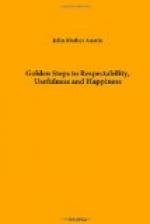“Jerusalem is another good subject, and the examination would afford scope for the exercise of the faculties of the highest minds for many Sabbaths: find when the city is first named, and from the manner in which it is mentioned, and the circumstances connected with the earliest accounts of it, ascertain what sort of a city it was at that time. Then follow its history down; notice the changes as they occur; understand every revolution, examine the circumstances of every battle and siege of which it is the scene, and thus become acquainted with its whole story down to the time when the sacred narration leaves it. To do this well, will require patient and careful investigation. You cannot do it as you can read a chapter, carelessly and with an unconcerned and uninterested mind; you must, if you would succeed in such an investigation, engage in it in earnest. And that is the very advantage of such a method of study; it breaks up effectually that habit of listless, dull, inattentive reading of the Bible which so extensively prevails.
“You may take the subject of the Sabbath; examine the circumstances of its first appointment, and then follow its history down, so far as it is given in the Bible, to the last Sabbath alluded to on the sacred pages.
“The variety of topics which might profitably be studied in this way is vastly greater than would at first be supposed. There are a great number of biographical and geographical topics—a great number which relate to manners, and customs, and sacred instructions. In fact, the whole Bible may be analyzed in this way; and its various contents brought before the mind in new aspects, and with a freshness and vividness which, in the mere repeated reading of the Scriptures in regular course, can never be seen."[10]
[Footnote 10: Abbott’s Young Christian.]
In connection with this general subject, I would make a few suggestions to the young, in regard to those who differ from them on religious doctrines. That there should be a diversity of opinions in respect to a subject so purely speculative as religion, should not be a matter of surprise. Indeed, when the disparity in strength of mind, intelligence, discrimination, early instruction, and educational bias, which prevails in society, is taken into consideration, it would be singular if religious differences did not exist. Our civil institutions and laws, guaranteeing unto every individual unlimited freedom of opinion, encourage investigations which tend, for a definite period at least, to produce these differences.
There are not a few who view with alarm the multiplicity of religious doctrines and sects, which prevails in our day. They are disposed to look upon it as an imperfection in our institutions, or as a token of the degeneracy of our age; and they fear that the most disastrous consequences will flow from it to Christianity. I cannot but view these apprehensions as groundless. They seem to grow out of a singular




